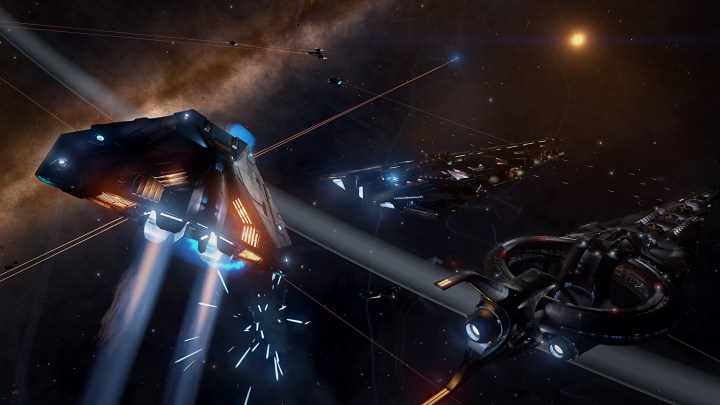
However, there are a lot of science fiction games set in space that run the gamut of genres already out there, so you can supplement the exploration in No Man’s Sky with other titles to scratch your various gameplay related itches. Here are eight such games that’ll fill your desires to be a space marine, space cowboy, space explorer, and space trucker.
Mass Effect

No Man’s Sky lets you drop onto a variety of planets, where you’ll generally drive around, picking up rocks and other fairly uninteresting objects off the ground. If you want to scour mostly empty planets for fairly boring objects, Mass Effect has you covered. A big chunk of the side mission portion of BioWare’s trilogy opener has players driving the Mako space rover across the surfaces of planets, finding beacons with snippets of story attached —just like in No Man’s Sky. The difference is, once you get bored of finding medals, crashed ships, or weird alien stones in Mass Effect, you can go back to the portion of its galaxy that actually has civilization. And a story.
Elite: Dangerous

The core tenets of Elite: Dangerous are very similar to the exploration-heavy gameplay of No Man’s Sky. You can mine objects in space, get into dogfights, game the economy, or become a pirate as you work your way through a universe that features some procedural generation, similar to the near infinite worlds of No Man’s Sky. Elite: Dangerous also has a giant, scale version of a galaxy to explore as an open world with more than 400 billion star systems. It is not quite as big as No Man’s Sky, but this galaxy actually has other players in it.
Out There

Out There, released on iOS and Android before making its way to PC, feels like a pared-back version of No Man’s Sky, focusing more on covering vast distances while trying to stay alive. The game has you piloting a ship, seeking out a strange ancient alien forces in a distant system, while managing your air and resources to keep yourself breathing and flying. There are also planets to land on, where players will interact with aliens and slowly earn their language. Out There is definitely a bit thinner overall than No Man’s Sky, given that it’s a mobile title expanded for PCs, but it also focuses harder on the uncomfortable feeling of exploring, following the directions of a benevolent alien, and being driven on a strange cosmic journey.
Rebel Galaxy

Rebel Galaxy, another exploration-heavy indie, is built on “pillars” similar to the ideas fans expected to find in No Man’s Sky, like combat, trade, and exploration. The primary difference between Rebel Galaxy and No Man’s Sky is character. Developer Double Damage described its game as “swash-buckling,” which is way interesting than the stoic tone of most of No Man’s Sky. Playing Rebel Galaxy, you will interact with lots of aliens as you make your way through the void, and they’re much livelier than the office worker aliens you meet in No Man’s Sky.
Extrasolar

A private space exploration company has managed to send a whole heap of robotic rovers to Earth’s nearest extrasolar neighbor, and its crowd-sourcing the exploration side. Your job in Extrasolar is to drive the rover around the surface of the planet, dictating where it snaps photographs, and analyzing what it finds. Like No Man’s Sky, Extrasolar perfectly hits that innate child-like wonder you get from feeling like you’re the first person to lay eyes on an alien world, but also does a great job of grounding its ideas in modern space exploration realism. And then it rolls out an actual story, as you discover more and more startling information about the distant alien world.
Starbound

Players going into No Man’s Sky expecting lots of mining, crafting, and building in space may have felt let down. Though it offers plenty of opportunities to shoot rocks with lasers, and the ability to build better engines for your spaceship, No Man’s Sky doesn’t quite deliver the “building” part of that equation. Starbound, a 2D crafting game similar to Minecraft or Terraria, offers far more options for players who really want to customize their interplanetary adventures. If No Man’s Sky’s crafting options have left you wanting more, or if you wish you could leave more of a mark on those planets you visit, try Starbound.
EVE Online

EVE Online is the massively multiplayer online game of flying around in a spaceship — No Man’s Sky by way of World of Warcraft. To understand EVE, take the No Man’s Sky universe, then add other players, a legitimate economy, and factions that sometimes go to war. If you grabbed No Man’s Sky looking for a vast amount of freedom, a huge universe to explore (7,800 star systems or so), and chaos created by unpredictable other players, you want EVE.
The Solus Project

Navigating The Solus Project feels a lot like exploring a planet in No Man’s Sky at times, but its gameplay is much more intensely focused on survival than exploration. You’re responsible for managing your own food, water, and temperature as you explore, and you have to dodge the occasional deadly waterspout and flaming meteor shower. What’s more, while it is mechanically focused on survival, the game does feature a story to push you through the challenges of keeping themselves alive. If the survival proves too much, though, you can always switch it off in favor of just focusing on the story.


